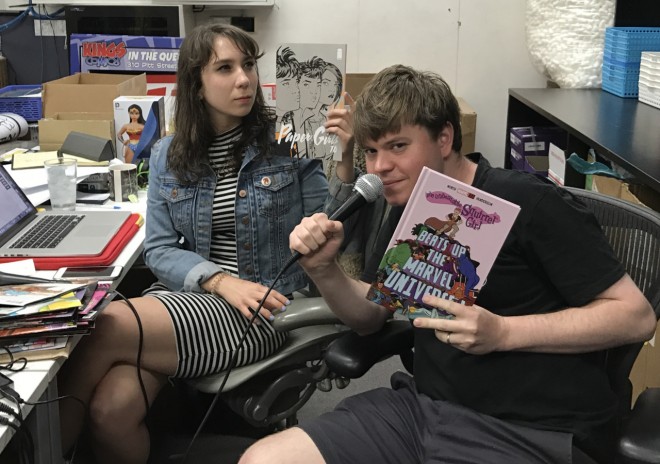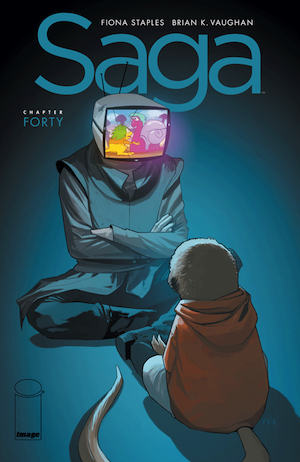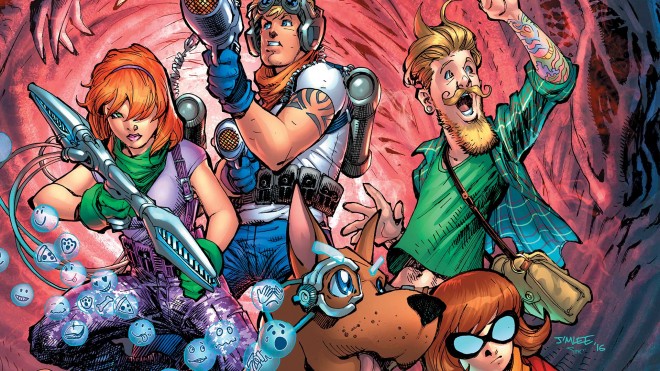Are Comics Still A Niche In 2016? A Roundtable On New Voices, Old Stories And Superheroes
"I don’t think there will ever be a comic book movie as good as the comic it is based on."

Comic books, graphic novels, trade paperbacks: whatever name they fall under, they are experiencing something of a renaissance now. With more and more comics-based properties on our TV and cinema screens, and with the rise of writers like Roxane Gay and Ta-Nehisi Coates entering the industry, the comic book world is more prominent in mainstream pop culture than ever.
However, this has not been without its problems From mundane things like particularly bad movies, to greater issues of representation and diversity within the medium, this corner of popular culture has seen its share of controversy in a year that wasn’t lacking in it.
To discuss the state of comic books in 2016, we’ve picked the brains of the hosts of the Australia’s own weekly comic book podcast, Serious Issues: Andrew Levins and Siobhan Coombs (who also works at Sydney’s Kings Comics and runs a women’s-only monthly comic book club, Queens of Kings).

Junkee: To start, looking back on 2016, how would you judge the health of comic books and graphic novels, as a niche within pop culture?
Siobhan Coombes: Well, I think we’re going through weird, interesting times, where there is more interest in comic books than I’ve ever seen in my life. It always astounds me — the amount of people who know about things like Saga.

Saga #40, cover art by Fiona Staples.
There have been comics before as good as Saga, but you never hear anyone talk about it. There are so many movies and TV shows people now share in a common language that before used to be a secret code. It feels like I can talk to anyone about comics, which is exciting and fun.
Andrew Levins: I think more people are aware of comics, especially comic book characters. But there is definitely still a stigma attached to the act of actually reading comics…
SC: More people are definitely more into the movies — and will talk to me about the movies — than physical, actual comics.
AL: I still get people who I don’t know very well, and I tell them all the different things about myself, and the funniest thing they learn about me is that I read comics. Not that I used to have a restaurant. Not that I look 10 years old and have two kids. It’s always “oh, you still read comics? Never got that kind of vibe.”
The “Big Two” comic book publishers have faced a lot of changes over the past year. DC has relaunched all its titles with the Rebirth initiative, while Marvel has continued to change up its roster both in terms of fictional characters and its staff; one of their most high-profile recent works has been the work of renowned writer Ta-Nehisi Coates on Black Panther.
What do you think are the major takeaways from mainstream comics in 2016?
SC: I think that 2016 has definitely been a year of diversity for comics, which is really nice to see. I think that the Big Two — Marvel to a certain extent more than DC — are finally putting more emphasis on diversity by hiring more diverse creators which is the key thing. You can have a million white dudes writing black characters. What we really need to see is that diversity on the creative end.
AL: I think, about the diversity thing, that when a publisher gets that wrong, that’s the only thing I really get upset about. Like, if a story sucks, a story sucks. The good thing about comics is that there are about 400 stories that come out every week. It’s pretty easy to overlook the bad and be like, “Oh, there’s the good ones, but it’s just not right now.” The answer to “when will this comic be good again?” is usually “about half a year”.
But there’s definitely a lot of politics in this, especially when it comes to massive publishers like Marvel. I think when they get things wrong like diversity, or addressing social issues, those are the things that give me the shits about comics. Not “oh, I can’t believe this character is dead, and this character got brought to life after just six months!” That’s just how comic books work.
Meanwhile, Image Comics has become arguably the largest publisher of independent comics thanks mostly to the success of The Walking Dead as a comic, television show, and brand. How do you think that show’s success has changed independent comics?
SC: Thank God for The Walking Dead, right? I don’t read it, but I am so conscious of how much Image has changed since The Walking Dead started ten years ago, and what a different environment it seems to be now. And what’s cool about them is that anyone can approach Image, and if they have enough money, they can print that comic book.
AL: I think you don’t get the smaller, more diverse publications, without having a massive mainstream hit. I don’t mind that The Walking Dead is an enormous television show — that I can’t watch a second of — because I know the space it creates allows so many other things that I do enjoy to exist.
On the topic of The Walking Dead, we’ve seen a lot of comic book adaptations, both on TV and in cinemas, with varying degrees of success. How do you feel about them, both objectively speaking, and as fans of the original work?
AL: When it comes to movies, I’m part of the problem. I go see everything. Even if I know it’s going to be bad. Even if the last thing they did was terrible. I’m still going to go and give them my money. Because I can’t spend all my life reading these guys, then not want to see them on the big screen.
So I guess you’ll be first in line for Justice League?
AL: I’ll be there opening day!
SC: Yeah, definitely. I enjoy the movies. I like the bizarre thing of a crazy obscure character you’d never expect to see on a cinema screen. That’s always fun.
AL: There’s always something you can find to enjoy in a superhero movie.
SC: But my key thing is that I like comic books for what they are. I barely watch any TV. I watch movies. But my favourite thing of all-time is comic books. I think you’ll always lose something in translation. But I don’t think there will ever be a comic book movie as good as the comic it is based on.
I do think superheroes, as a genre, work really well on both movies and TV. But they just don’t interest me as much as a physical comic book.
AL: I was speaking before from the point-of-view of seeing superheroes in movies, but I’m not interested one bit in direct adaptations of comics. They very rarely excel far beyond “not putting me to sleep”. They’re not for me. They’re still a very good entry point for newcomers into comics. Not so much the other way around.
SC: It’s not that they’re bad. I think they’re good and of value. I think the Netflix TV series’ have been really great. I think the Marvel movies have been heaps of fun. They’re just different.
We’ve also seen mainstream television and cinema borrowing story techniques and styles from the realm of comic books. While the most prominent examples have been the push towards shared franchise universes at major film studios, we’ve also seen comic book writers hired to work on genre TV like Westworld. Thoughts?
SC: That’s interesting, because whenever I hear people say how great television is now, I just think, “That shit has been happening in comic books for 50 years!” It doesn’t seem like anything new to me? It’s exciting and cool that it’s happening in TV, finally. But I think people are really starting to see the real artistic value in comic book storytelling.
AL: I do think that not everything should be a shared universe. Stories should have an end-point. Most stories should have an end-point. They don’t all have to tie into other things. It can get quite exhausting; you’re not just seeing a 90-minute movie sitting on its own. You’re about to unlock a potential 100-hour marathon of movies that you are going to watch for the rest of your life.
SC: It’s funny, because so many people talk about how the thing that stops them getting into comics is those types of barriers. That there’s so much assumed knowledge, and you have to have read for the past 12 months to understand what’s going on in most superhero comics. It’s funny that now people experience that with the movies. You have to have watched all of the Marvel movies to understand what was going on in Captain America 3.
On the topic of diversity, we’ve seen major strides in terms of representation within the industry and comics culture. However, at the same time the industry and community alike are still rife with issues of marginalisation of women and minorities. How do you feel about these contrasting social states within the comic community?
SC: I think those are things that occur in every community, and as things become unacceptable and society changes you have to confront that head-on. The thing about comics is that it’s still run by mostly old white men. But that’s going to change. I do have a lot of hope for the new generation of comic book writers and the people that are yet to emerge.
AL: I started podcasting because I love comic books, I love video games, I love those worlds. But I hate the general idea of who that kind of fan is? I’m passionately inclusive. I want to transcend the idea of what it means to be a fan of these cultures. I totally acknowledge that comic book culture can be really really caustic and really anti-Siobhan and me, at times. And I know starting a podcast about comic books is a tiny step but I’m proud that Siobhan hosts with me every week. We’re probably one of the very few chances that you can get to listen to someone who isn’t a fucking white dude talk about comic books every week.
SC: I’m not going to lie: I was — and still am — slight anxious about putting my voice out there, because I see how poorly other women are treated in the comics community for just being women. The idea that someone would dox me because of my opinions on Captain America is completely terrifying.
But I’ve been so overwhelmed by the positive response that I’ve gotten. I really thought that I would more of a response of, “Ugh, who’s that fucking chick?” because I’ve had that before working in a comic book store. But I’ve think that there’s been real significant change in that now you’re able to find communities that think in the same way you do. Running the women’s group, Queens of Kings, at Kings Comics has been the most fun for me. Being able to set up a group of 20 women who meet up once a month to talk about comic books… I can’t imagine that happening 10 years ago, or even when I started working in comics seven or eight years ago. Now I get to be a part of that, and that’s so fun and cool.
AL: When I see people who like bad comics, I don’t care. The people I don’t like are those who are into the bad parts of comics. The ones who are only into comics for the sexual objectification of women; who are only into seeing people they can immediately relate to from a physical point-of-view as the protagonist. If you like Civil War 2, whatever. I don’t give a fuck. But if you are only into comics for all the reasons that it needs to change? That’s where we have a problem and that’s when it’s important for our show to exist and push a different point-of-view to as many people who will listen to us. Whatever tiny little step our podcast makes, it means we’re two voices who aren’t those fucking voices.
Quickly: favourites and least-favourites comics of 2016?
AL: Hmm, can we just leave it favourites? [laughs]
SC: Wait! I have a least favourite!
AL: Civil War 2?
SC: And Scooby Doo Apocalypse! I think those two really typify things that are bad in comics in 2016. Scooby Apocalypse, especially, is written and illustrated by old men, trying to be cool, and missing the mark really dramatically.

Opposed to that, one of my favourite things DC has done all year has been The Flintstones comic, which came out of the same Hanna-Barbera relaunch project. But it’s all about the creative team that you get there.
AL: And it’s still run by two white old men. But it’s an amazing comic. It’s so good, I’m buying it for my dad! My dad is someone who grew up on The Flintstones and gives a fuck about the world, so I think he will really enjoy it.
Lastly, where do you think comics will go from here?
SC: I don’t know. It depends on whether you mean comics or superhero comics. Because superhero comics are fairly cyclical, and will just keep going the way it is with low-key positive changes. I think we’re headed in the right direction. But that could turn around and not be good anymore.
AL: There’ll be more high-profile writers, like Ta-Nehisi Coates, coming over into comic books, as well. Even non-writers; [former professional wrestler] CM Punk writes a Drax comic. We’ll see more things like that. I also think it’ll become more accessible for those that don’t yet have the means.
SC: I feel like we’re living in this insane Golden Time, where there is always something that I want to read every single week.
AL: And although it can get really overwhelming, you can just tap out. And when you come back, there’ll still be the things you love and a bunch of stuff you didn’t know you will love yet.
SC: To be honest, I’m feeling really exhausted by superhero comics at the moment. There’s just so many, and they’re all the same. But at the end of the day, I can still go, “Aw yes, new issues of Saga and Jughead this week!” So there’s that.
AL: Even then, this year we got Marvel’s The Vision, we got DC’s Young Animal. Those are the type of things that subvert what a superhero comic is supposed to be. They make you enjoy the genre more.
–
Serious Issues will be holding an end-of-year party and live podcast recording, with out-of-print and rare comics for sale. More information can be found here. You can find more information about Siobhan’s monthly comic book club here.
–
Albert Santos is a Sydney writer. You can find them on Twitter here.




